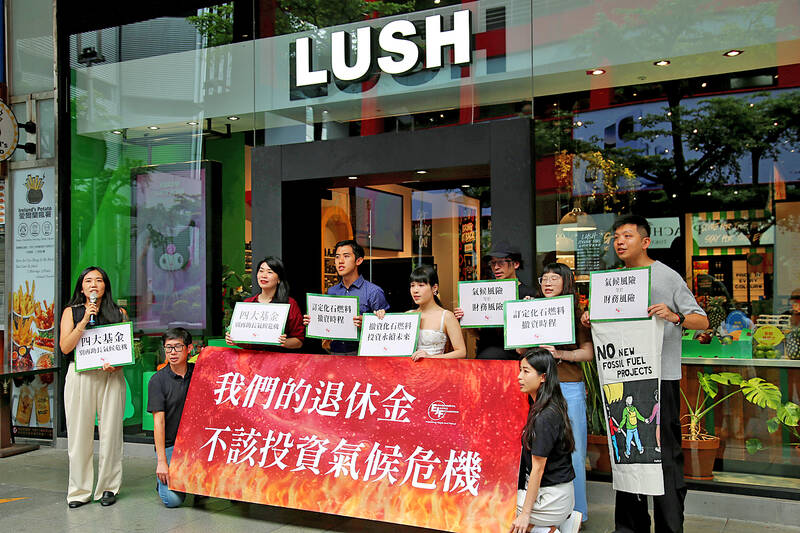Labor pension reserve funds could shrink by more than 30 percent by 2050 if Taiwan’s four major funds continue to make large investments in high-carbon industries, environmental groups said yesterday, calling for disinvestment and climate-related financial disclosure of the funds.
Environmental Justice Foundation (EJF) climate campaigner Chen Ting-yu (陳庭毓) said that the Labor Pension Fund, Labor Insurance Fund, Public Service Pension Fund and Postal Savings have a collective capital of about NT$15 trillion (US$488.54 billion).
However, they continue to invest in high-carbon industries, such as petrochemicals, amid the net zero transition without sufficiently disclosing their investment portfolios and climate-related risks, she said.

Photo courtesy of the Environmental Justice Foundation
EJF senior campaigner Cecilia Wu (吳毓珮) cited Chunghwa Post Co (中華郵政) as an example, saying it is among the top 10 investors of several domestic high-carbon emitters, such as Formosa Petrochemical Corp, China Steel Corp, Asia Cement Corp and TCC Group Holdings Co.
Postal Savings’ capital totaled more than NT$7 trillion, which consists of money from many people with disadvantaged financial accessibility, but its domestic stock investment in high-carbon industries accounted for 49.6 percent last year, she said, citing Chunghwa Post’s sustainability report from last year.
The EJF has collaborated with the Open Culture Foundation to develop a climate profit-and-loss calculator to help people calculate their projected pension loss by 2050 under the four funds’ current investment strategies.
The calculator computes the fund return based on the estimated financial impact of carbon fees on the funds’ investment targets, without considering inflation, according to the calculator’s Web site (https://divest4future.ejfoundation.org).
Up to 1,667 organizations have committed to withdrawing capital from the petrochemical industry over the past decade, the collective asset size of which is more than US$40 trillion, 350 Taiwan adviser Chang Liang-yi (張良伊) said.
Such disinvestment is expected to increase financing costs for fossil fuel operators and redirect the capital to green energy developments, he said, calling on the four major funds to establish disinvestment timelines and invest in climate solutions for hedging instead.
Solutions for Our Climate Taipei Office director Milan Chen (陳米蘭) said that the Norway Government Pension Fund has been disinvesting from high-carbon industries since 2015, with recent investments focused on renewable energy and low-carbon infrastructure constructions.
The California Public Employees’ Retirement System also pledged to invest more than US$100 billion in green energy and sustainability industries, she said.
Environmental Rights Foundation deputy director Hsu Po-jen (許博任) urged the four funds to initiate investor engagement with their fossil fuel operators to help promote their green transitions, especially as profit margins for high-carbon traditional industries such as petrochemicals, steel and cement have plummeted due to global overcapacity.

Three batches of banana sauce imported from the Philippines were intercepted at the border after they were found to contain the banned industrial dye Orange G, the Food and Drug Administration (FDA) said yesterday. From today through Sept. 2 next year, all seasoning sauces from the Philippines are to be subject to the FDA’s strictest border inspection, meaning 100 percent testing for illegal dyes before entry is allowed, it said in a statement. Orange G is an industrial coloring agent that is not permitted for food use in Taiwan or internationally, said Cheng Wei-chih (鄭維智), head of the FDA’s Northern Center for

LOOKING NORTH: The base would enhance the military’s awareness of activities in the Bashi Channel, which China Coast Guard ships have been frequenting, an expert said The Philippine Navy on Thursday last week inaugurated a forward operating base in the country’s northern most province of Batanes, which at 185km from Taiwan would be strategically important in a military conflict in the Taiwan Strait. The Philippine Daily Inquirer quoted Northern Luzon Command Commander Lieutenant General Fernyl Buca as saying that the base in Mahatao would bolster the country’s northern defenses and response capabilities. The base is also a response to the “irregular presence this month of armed” of China Coast Guard vessels frequenting the Bashi Channel in the Luzon Strait just south of Taiwan, the paper reported, citing a

A total lunar eclipse, an astronomical event often referred to as a “blood moon,” would be visible to sky watchers in Taiwan starting just before midnight on Sunday night, the Taipei Astronomical Museum said. The phenomenon is also called “blood moon” due to the reddish-orange hue it takes on as the Earth passes directly between the sun and the moon, completely blocking direct sunlight from reaching the lunar surface. The only light is refracted by the Earth’s atmosphere, and its red wavelengths are bent toward the moon, illuminating it in a dramatic crimson light. Describing the event as the most important astronomical phenomenon

UNDER PRESSURE: The report cited numerous events that have happened this year to show increased coercion from China, such as military drills and legal threats The Chinese Communist Party (CCP) aims to reinforce its “one China” principle and the idea that Taiwan belongs to the People’s Republic of China by hosting celebratory events this year for the 80th anniversary of the end of World War II, the “retrocession” of Taiwan and the establishment of the UN, the Mainland Affairs Council (MAC) said in its latest report to the Legislative Yuan. Taking advantage of the significant anniversaries, Chinese officials are attempting to assert China’s sovereignty over Taiwan through interviews with international news media and cross-strait exchange events, the report said. Beijing intends to reinforce its “one China” principle